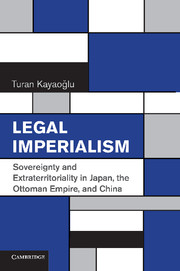Book contents
- Frontmatter
- Contents
- Tables and Figures
- Acknowledgments
- Introduction: Extraterritoriality in British Legal Imperialism
- 1 Positive Law and Sovereignty
- 2 Extraterritoriality and Legal Imperialism
- 3 Japan's Rapid Rise to Sovereignty
- 4 The Ottoman Empire's Elusive Dream of Sovereignty
- 5 China's Struggle for Sovereignty
- Conclusion: American Legal Imperialism – Extraterritoriality Today
- Bibliography
- Index
5 - China's Struggle for Sovereignty
Published online by Cambridge University Press: 25 May 2010
- Frontmatter
- Contents
- Tables and Figures
- Acknowledgments
- Introduction: Extraterritoriality in British Legal Imperialism
- 1 Positive Law and Sovereignty
- 2 Extraterritoriality and Legal Imperialism
- 3 Japan's Rapid Rise to Sovereignty
- 4 The Ottoman Empire's Elusive Dream of Sovereignty
- 5 China's Struggle for Sovereignty
- Conclusion: American Legal Imperialism – Extraterritoriality Today
- Bibliography
- Index
Summary
Although Mao claimed to have ended foreign imperialism in China in 1949, in fact, the most important imperialist practice in China, extraterritoriality, had been ended by the Guomindang in 1943. China engaged in a long and painful struggle for its territorial sovereignty during the period between the 1842 Opium War settlement and the conclusion of wartime treaties with the United States and Britain in 1943. When comparing the abolition of extraterritoriality in China to that of Japan and the Ottoman Empire, several factors appear different. To begin with, despite a vehement and occasionally violent Chinese nationalist opposition to extraterritoriality, Western states succeeded in maintaining extraterritoriality in China until the comparatively late date of 1943. This lengthy extraterritorial regime ended as a result of an Anglo-American initiative at a time when there was not much Chinese lobbying for its abolition. China is the only case in which the abolition of extraterritoriality occurred during wartime; in Japan it occurred during peacetime and in Turkey as a part of a peace treaty.
Scholars offer different explanations for why the United States and Britain abolished extraterritoriality in China in 1943. One group of historians links the abolition decision to the Allies’ support of China. The historian Nicholas R. Clifford suggests that the abolition of extraterritoriality was the United States’ and Britain's “gesture of support to their wartime ally.” Similarly, another historian, Akira Iriye, argues that the abolition of extraterritoriality was a “symbolic gesture to counter Japanese propaganda about Anglo-American imperialism.” A second group of historians ties the abolition decision to the de facto eradication of extraterritoriality during the Second World War.
- Type
- Chapter
- Information
- Legal ImperialismSovereignty and Extraterritoriality in Japan, the Ottoman Empire, and China, pp. 149 - 190Publisher: Cambridge University PressPrint publication year: 2010



